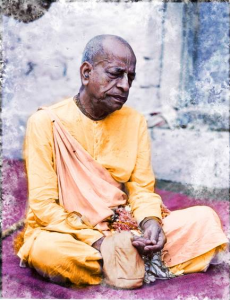1.) SB 2.7.19 purport...
The whole process is that all living entities, being constitutionally parts and parcels of the supreme living being, the Absolute Personality of Godhead, have proportionately minute independence of action also. So the preliminary qualification for entering into the devotional service of the Lord is that one become a willing cooperator, and as such one should voluntarily cooperate with persons who are already engaged in the transcendental devotional service of the Lord. By cooperating with such persons, the prospective candidate will gradually learn the techniques of devotional service, and with the progress of such learning one becomes proportionately free from the contamination of material association. Such a purificatory process will establish the prospective candidate in firm faith and gradually elevate him to the stage of transcendental taste for such devotional service. Thus he acquires a genuine attachment for the devotional service of the Lord, and his conviction carries him on to the point of ecstasy, just prior to the stage of transcendental love.
2.) SB 2.7.31 purport…
Here it is clearly mentioned that the inhabitants of Vṛndāvana were extensively busy in the hard labor of their day’s work, and due to the day’s hard labor they were engaged in sound sleep at night. So practically they had very little time to devote to meditation or to the other paraphernalia of spiritual activities. But factually they were engaged in the highest spiritual activities only. Everything done by them was spiritualized because everything was dovetailed in their relationship with Lord Śrī Kṛṣṇa. The central point of activities was Kṛṣṇa, and as such the so-called activities in the material world were saturated with spiritual potency. That is the advantage of the way of bhakti-yoga. One should discharge one’s duty on Lord Kṛṣṇa’s behalf, and all one’s actions will be saturated with Kṛṣṇa thought, the highest pattern of trance in spiritual realization.
3.) SB 2.7.37 purport…
Lord Buddha incarnates at a time when the people are most materialistic and preaches common-sense religious principles. Such ahiṁsā is not a religious principle itself, but it is an important quality for persons who are actually religious. It is a common-sense religion because one is advised to do no harm to any other animal or living being because such harmful actions are equally harmful to he who does the harm. Butbefore learning these principles of nonviolence one has to learn two other principles, namely to be humble and to be prideless. Unless one is humble and prideless, one cannot be harmless and nonviolent. And after being nonviolent one has to learn tolerance and simplicity of living.One must offer respects to the great religious preachers and spiritual leaders and also train the senses for controlled action, learning to be unattached to family and home, and enacting devotional service to the Lord, etc. At the ultimate stage one has to accept the Lord and become His devotee; otherwise there is no religion. In religious principles there must be God in the center; otherwise simple moral instructions are merely subreligious principles, generally known as upadharma, or nearness to religious principles.
Some Conclusions-the first purport Srila Prabhupada tells us , if we want to enter into devotional service, we must learn to cooperate with others who are already engaged in bhakti yoga activities , then we can learn the techniques of pure bhakti. Next he explains that the inhabitants of Vrndavana were not lazy bhaktas, but worked so hard daily that they could sleep soundly at night, and the main point was that all their activities were somehow connected to Lord Krsna. One should discharge his or her duties only on behalf of the Supreme Lords satisfaction. The last purport explains that before all this can happen, we must learn to be humble and prideless, then we can be nonviolent and after learning these things, then we can learn tolerance and simple living principles.
Hare Krsna
damaghosa das
…”and after learning these things, then we can learn tolerance and simple living principles.”


